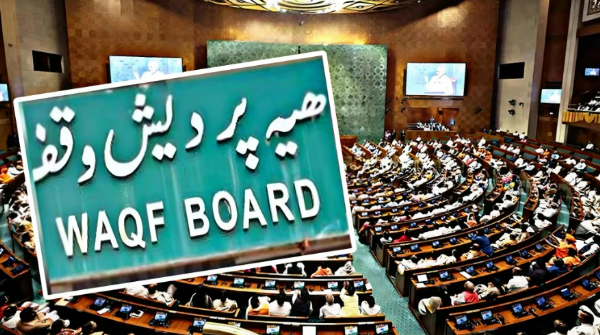Waqf Amendment Bill Explained
18 Sep 2024 16:29:23
The concept of Waqf—a significant institution in Islamic law—has become a focal point of debate in India, especially with the Modi government introducing Waqf (Amendment) Bill, 2024. It has not only shaped religious and cultural aspects but also led to numerous legal and political conflicts regarding land ownership and management.

What is Waqf?
The very literal meaning of Waqf is detention or confinement and prohibition. As per Islam, it is the property that is now available only for religious or charitable purposes, and any other use or sale of the property is prohibited. As per Sharia law, once Waqf is established, and the property is dedicated to Waqf, it remains as Waqf property forever.
It means that the ownership of the property is now taken away from the person making Waqf and transferred and detained by Allah. As per Sharia, this property is now permanently dedicated to Allah, making Waqf irrevocable in nature.
The Controversy Over Waqf Properties
One major issue is the vast number of properties claimed as Waqf. Thousands of properties, from private land to prime urban real estate, have been registered under Waqf—often without adequate documentation or consent from the original owners. This has led to numerous legal disputes over land ownership and raised concerns about potential misuse of the Waqf system for land acquisition.
Waqf Amendment Bill
In response to these issues, the Modi government has proposed amendments to the Waqf Act. The Waqf (Amendment) Bill seeks to “effectively address” issues related to the powers of the State Waqf Boards, registration and survey of waqf properties and removal of encroachments. The Waqf (Amendment) Bill, 2024, which amends the Waqf Act, 1995, was introduced by Minority Affairs Minister Kiren Rijiju.
It seeks to clearly define “waqf” as waqf by any person practicing Islam for at least five years and having ownership of such property and ensure that creation of Waqf-alal-aulad does not lead to the denial of inheritance rights to women.
It also seeks to omit the provisions relating to the “waqf by user”, provide the functions of the Survey Commissioner to the Collector or any other officer not below the rank of Deputy Collector duly nominated by the Collector for the survey of waqf properties, provide for a broad-based composition of the Central Waqf Council and the State Waqf Boards and ensure representation of Muslim women and non-Muslims.
According to the statement of objects and reasons, the bill seeks to provide for the establishment of a separate Board of Auqaf for Boharas and Aghakhanis. It provides for the representation of Shia, Sunni, Bohra, Agakhani and other backward classes among Muslim communities, streamlining the manner of registration of waqfs through a central portal and database and providing for a detailed procedure for mutation as per revenue laws with due notice to all concerned before recording any property as waqf property.
The Modi government's proposed reforms aim to address misuse, enhance transparency, and ensure that Waqf properties are used appropriately. While opposition to these reforms remains strong, the need for a fair and accountable system is evident.

What is Waqf?
The very literal meaning of Waqf is detention or confinement and prohibition. As per Islam, it is the property that is now available only for religious or charitable purposes, and any other use or sale of the property is prohibited. As per Sharia law, once Waqf is established, and the property is dedicated to Waqf, it remains as Waqf property forever.
It means that the ownership of the property is now taken away from the person making Waqf and transferred and detained by Allah. As per Sharia, this property is now permanently dedicated to Allah, making Waqf irrevocable in nature.
The Controversy Over Waqf Properties
One major issue is the vast number of properties claimed as Waqf. Thousands of properties, from private land to prime urban real estate, have been registered under Waqf—often without adequate documentation or consent from the original owners. This has led to numerous legal disputes over land ownership and raised concerns about potential misuse of the Waqf system for land acquisition.
Waqf Amendment Bill
In response to these issues, the Modi government has proposed amendments to the Waqf Act. The Waqf (Amendment) Bill seeks to “effectively address” issues related to the powers of the State Waqf Boards, registration and survey of waqf properties and removal of encroachments. The Waqf (Amendment) Bill, 2024, which amends the Waqf Act, 1995, was introduced by Minority Affairs Minister Kiren Rijiju.
It seeks to clearly define “waqf” as waqf by any person practicing Islam for at least five years and having ownership of such property and ensure that creation of Waqf-alal-aulad does not lead to the denial of inheritance rights to women.
It also seeks to omit the provisions relating to the “waqf by user”, provide the functions of the Survey Commissioner to the Collector or any other officer not below the rank of Deputy Collector duly nominated by the Collector for the survey of waqf properties, provide for a broad-based composition of the Central Waqf Council and the State Waqf Boards and ensure representation of Muslim women and non-Muslims.
According to the statement of objects and reasons, the bill seeks to provide for the establishment of a separate Board of Auqaf for Boharas and Aghakhanis. It provides for the representation of Shia, Sunni, Bohra, Agakhani and other backward classes among Muslim communities, streamlining the manner of registration of waqfs through a central portal and database and providing for a detailed procedure for mutation as per revenue laws with due notice to all concerned before recording any property as waqf property.
The Modi government's proposed reforms aim to address misuse, enhance transparency, and ensure that Waqf properties are used appropriately. While opposition to these reforms remains strong, the need for a fair and accountable system is evident.